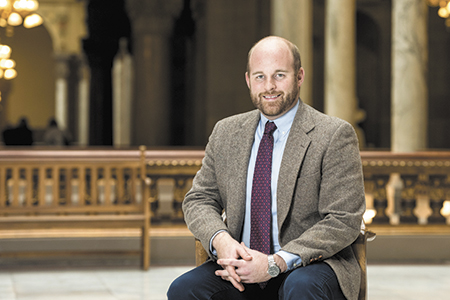Subscriber Benefit
As a subscriber you can listen to articles at work, in the car, or while you work out. Subscribe NowJustin Allen has been practicing just five years, but he’s distinguished himself as a leader at his firm and in bar associations. He serves as president of IndyBar’s Young Lawyers Division. His leadership is also evident in his community service. He is vice chair of the board of Hear Indiana, which provides resources for deaf and hearing-impaired Hoosiers.
 When did you first decide you would become a lawyer, and what motivated you?
When did you first decide you would become a lawyer, and what motivated you?
I decided to become a lawyer while in college. I had a philosophy professor with a law degree who steered me toward our moot court team and prelaw courses and helped mentor me on my decision.
Why is it important to you to be active in the Young Lawyers Division of the Indianapolis Bar Association?
The Young Lawyers Division has been my bridge to the Indy legal community. I knew virtually no one when I first moved here. IndyBar (and the YLD in particular) introduced me to some great friends and professional colleagues around the city. I stay involved to continue to make these connections, and I serve as president with the hope that we can continue to provide programming to help foster these connections for others.
What’s been the most rewarding aspect of your practice?
I really enjoy the variety. I get to work on a lot of different kinds of cases — commercial disputes, insurance coverage, employment, environmental law, even niche areas like agriculture and professional licensing. Our firm has a diverse litigation practice and I enjoy working with clients from Fortune 500 companies to small businesses to individuals to local municipalities. I like the challenge and stimulation that comes with this kind of varied work. Every day is something different.
What do you most enjoy doing when you’re not in the office?
Indianapolis has turned me into a pretty big racing fan. An ideal weekend for me is camping out at a race track with my fiancée.
Where do you see yourself in 20 years?
Hopefully working as a partner at my current firm. I also think it would be very rewarding to serve as a judge. If I ever leave the legal profession, I’d love to start a BBQ restaurant. But no matter what I’m doing in my career, I plan to make Indianapolis my home.
What’s something about you not many people know?
I have a very slight hearing loss in my right ear from getting a small rock stuck in it as a kid. I can hear pretty well out of it, but will generally use my left ear when talking on the phone.
What drew you to environmental litigation?
I got into environmental litigation mostly by chance. It wasn’t something I was actively looking to do during law school, but I was exposed to it during my summer associate job and have had a lot of opportunities to work on environmental cases since graduating from law school. I would have never expected to end up in an environmental practice, but I enjoy the work.
How do you see the legal profession changing in the next decade?
We’re seeing established attorneys retiring in large numbers, and new attorneys aren’t replacing them at the same rate. And a lot new attorneys aren’t “practicing law” in the traditional sense, so it is very hard to predict what the profession will look like in 10 years. I think it will be both a challenge and a unique opportunity for those of us who are just starting out.
What was your most memorable job before becoming an attorney?
I worked in the restaurant industry for about eight years. Waiting tables teaches you how to talk on your feet, provide good customer service, deal with all sorts of different personalities, and work under tight time constraints while juggling multiple clients — all skills you need to have in a litigation practice.
If you hadn’t pursued a legal career, what would you be doing instead?
It is really hard to say where I would have wound up if I wasn’t a lawyer. I think I’d probably be in journalism or some other career that involves a lot of writing.•
Please enable JavaScript to view this content.
